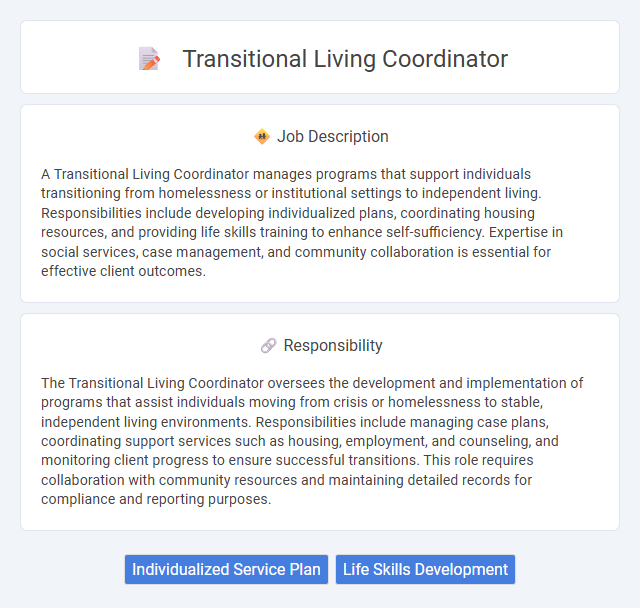
A Transitional Living Coordinator manages programs that support individuals transitioning from homelessness or institutional settings to independent living. Responsibilities include developing individualized plans, coordinating housing resources, and providing life skills training to enhance self-sufficiency. Expertise in social services, case management, and community collaboration is essential for effective client outcomes.
Individuals with strong organizational skills and empathy are likely to succeed as Transitional Living Coordinators, as the role involves managing housing services for people experiencing homelessness or instability. Candidates who handle stress well and possess excellent communication abilities probably excel in maintaining relationships with clients and community resources. Those lacking patience or flexibility may find this position challenging due to the complex and sometimes unpredictable needs of the population served.
Qualification
A Transitional Living Coordinator typically requires a bachelor's degree in social work, psychology, or a related human services field, along with experience in case management or transitional housing programs. Strong communication, organizational, and problem-solving skills are essential for coordinating services and supporting clients during their transition to independent living. Certification in crisis intervention or counseling can enhance qualifications and effectiveness in managing client needs.
Responsibility
The Transitional Living Coordinator oversees the development and implementation of programs that assist individuals moving from crisis or homelessness to stable, independent living environments. Responsibilities include managing case plans, coordinating support services such as housing, employment, and counseling, and monitoring client progress to ensure successful transitions. This role requires collaboration with community resources and maintaining detailed records for compliance and reporting purposes.
Benefit
The role of a Transitional Living Coordinator likely offers benefits such as professional growth through hands-on experience in social services and case management. There is a probability of gaining valuable skills in client support, program coordination, and community resource networking. Employee benefits may also include healthcare, paid time off, and opportunities for further education or certification.
Challenge
The Transitional Living Coordinator role likely involves navigating complex case management challenges, requiring strong problem-solving skills to support individuals during critical periods of change. Managing limited resources and addressing diverse client needs may present ongoing difficulties that demand adaptability and resilience. It is probable that coordinating with multiple agencies and stakeholders adds layers of complexity to achieving positive transitional outcomes.
Career Advancement
A Transitional Living Coordinator plays a crucial role in guiding individuals from unstable housing situations to independent living, managing resources, and providing essential support services. Professionals in this role gain valuable experience in case management, program development, and social services, which opens pathways to advanced positions such as program managers or social service directors. Career advancement opportunities often include specialized certifications and leadership roles within nonprofit organizations, government agencies, or healthcare systems.
Key Terms
Individualized Service Plan
The Transitional Living Coordinator develops and implements comprehensive Individualized Service Plans (ISPs) tailored to meet the unique needs of each client, facilitating their successful transition from homelessness or crisis to stable housing. They collaborate closely with multidisciplinary teams to assess client strengths and barriers, ensuring that ISPs include targeted goals, resource connections, and skill-building activities. Consistent monitoring and adjustment of the ISPs foster client independence and long-term stability in housing, employment, and personal wellbeing.
Life Skills Development
The Transitional Living Coordinator specializes in life skills development, helping individuals acquire essential abilities for independent living such as budgeting, cooking, and time management. They design and implement personalized life skills training programs that foster self-sufficiency and confidence in daily activities. Collaboration with social services and community resources ensures comprehensive support tailored to each resident's unique needs.
 kuljobs.com
kuljobs.com